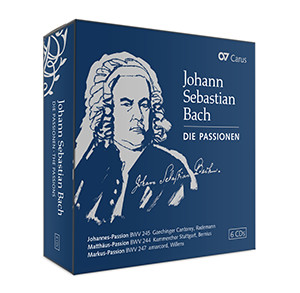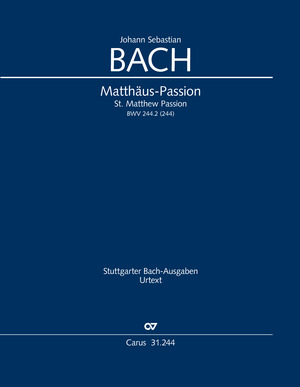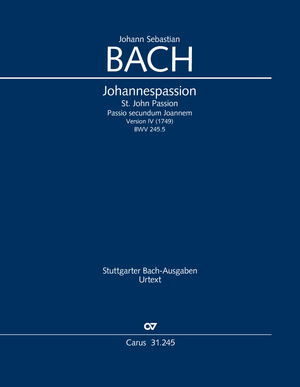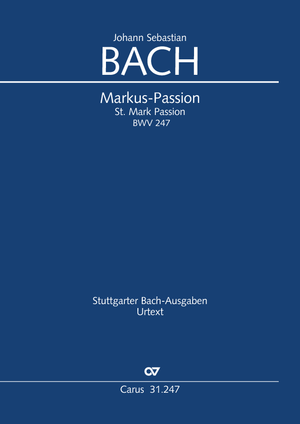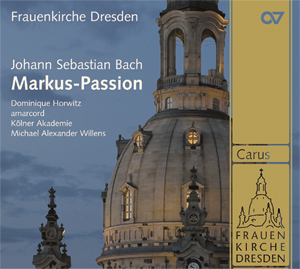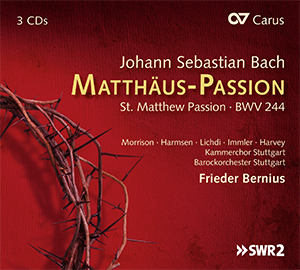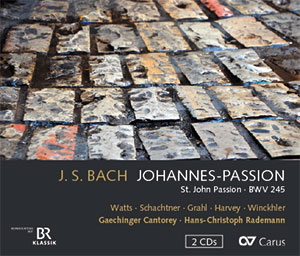The Passions
This box brings together three – in many respects – outstanding recordings of the great passions of Johann Sebastian Bach. Three? Exactly: The St. Matthew Passion, the St. John Passion and the St. Mark Passion.
The St. John Passion occupies a special place in Johann Sebastian Bach’s oeuvre: Since Bach himself repeatedly made changes to the work for his performances, numerous versions have survived. Hans-Christoph Rademann has chosen the fourth version. Composed shortly before Bach’s death, it is an authentic version by Bach, in contrast to the frequently performed (and recorded) mixture of the 1739 and ’49 variants, which the choir and ensemble of the Gaechinger Cantorey splendidly perform. The soloists are Elizabeth Watts, Benno Schachtner, Matthias Winckhler, Patrick Grahl and Peter Harvey.
With the St. Matthew Passion, Bach handed sown one of the most important works of Protestant church music ever written. The Kammerchor Stuttgart and the Barockorchester Stuttgart under the direction of Frieder Bernius have delicately mastered the monumental composition – which traces the Passion of Christ – with incomparable musical, emotional and spiritual intensity. The soloists are Hannah Morrison, Sophie Harmsen, Tilman Lichdi, Christian Immler and Peter Harvey.
Finally, the St. Mark Passion. It is one of the little known treasures in Bach’s sacred works, which is no wonder as the autograph disappeared and the surviving copies were lost in the turmoil of the Second World War. Nevertheless, in the early 1960s, the work of 1731 appeared in print for the first time. Finally, the renowned Leipzig Bach researcher Andreas Glöckner revised this version – which is based on surviving parody models – for Carus. The Leipzig vocal ensemble amarcord and the Kölner Akademie, directed by Michael Alexander Willens, recorded the work in the Dresden Frauenkirche. The gospel text is recited by the well-known actor Dominique Horwitz.
-
Composer
Johann Sebastian Bach
| 1685-1750Johann Sebastian Bach is one of the most important composers of Western music history. He came from a widely ramified musical dynasty, which produced numerous musicians and organists in the Thuringian-Saxon area.
Bach vocal
Ever since Carus-Verlag was founded in 1972, publishing the music of Johann Sebastian Bach has been a special focus for us. In the 2017 Reformation anniversary year we completed the Bach vocal project. Bach's complete sacred vocal works are now available in modern Urtext editions, together with performance material. A complete edition of all the full scores is also available in a high quality box set. Personal details
-
Choir
Kammerchor Stuttgart
The Kammerchor Stuttgart is regarded as one of the best ensembles of its kind. Over its fifty-year existence, Frieder Bernius has developed the choir into an exceptional ensemble acclaimed by audiences and press alike. This has led to invitations for the choir to perform at all the important European festivals. In Germany the chamber choir performs at festivals and in concert halls in repertoire ranging from the 17th to the 21st century. Frieder Bernius and his ensemble have received numerous accolades for their contribution to new music. The Kammerchor Stuttgart has made over 80 CDs and LPs, numerous of which have been awarded international recording prizes (including the Edison award, Diapason d’or, Gramophone Choice, Classical Internet Award, International Classical Music Award, and German Record Critics’ Award prizes). The International Federation for Choral Music has invited the ensemble to sing at the 1st, 4th and 10th World Symposia on Choral Music in Vienna, Sydney and Seoul. Regular tours of North America and Asia since 1988 and a South America tour reflect the Kammerchor Stuttgart’s international reputation. Since 1984 the top ensemble has also been invited to Israel biennially. Personal details
-
Ensemble
amarcord
An unmistakable sound, breathtaking blend, tremendous sense of musical assurance and a good portion of charm and wit are amarcord’s special hallmarks. The group’s extremely diverse and wide-ranging repertoire encompasses medieval songs, Renaissance madrigals and masses, compositions and cycles of works from the European Romantic and 20th century as well as a cappella arrangements of folk songs from all over the world, and well-known rock, pop, soul, and jazz songs. The ensemble has won prizes at numerous international competitions. In 2002 amarcord won the Deutscher Musikwettbewerb. Alongside the Gewandhaus Orchestra and St. Thomas’s Choir, amarcord is one of the most important representatives of the music city of Leipzig at home and abroad. The group is a frequent guest at leading music festivals. Numerous concert tours have taken the singers to over fifty countries and to almost every continent in the world. In association with the Goethe-Institut they have given guest performances in Australia, South East Asia, the Middle East, Russia, Africa, and Central America. The International Festival for Vocal Music "a cappella" (www.a-cappella-festival.de), inaugurated by amarcord in 1997, has become one of the most important festivals of its kind under the group’s artistic direction. Numerous CDs impressively document the different facets of amarcord’s repertoire, and have won many prizes such as ECHO Klassik (2010, 2012), the International Classical Music Award, Supersonic Award and the Contemporary A Cappella Recording Award. Personal details
-
Ensemble
Gaechinger Cantorey
The Gaechinger Cantorey is the ensemble of the International Bach Academy Stuttgart. It combines a Baroque orchestra and a hand-picked choir to form a finely tuned early music ensemble. Under the baton of academy director Hans-Christoph Rademann, this ensemble is dedicated to the international dissemination of a “Stuttgart Bach style.” Since its re-establishment as the Gaechinger Cantorey in 2016, the ensemble of the International Bach Academy has gained renown with numerous performances in Germany, such as at the Musikfest Stuttgart, the Bachwoche Ansbach, the Bachfest Leipzig, the Rheingau Music Festival, the Festspielhaus Baden-Baden, the Dresden Kulturpalast, and the Hamburg Elbphilharmonie, as well as abroad at the Théâtre des Champs-Élysées in Paris, in the USA (Fort Lauderdale, Chapel Hill, Norfolk, Princeton, Los Angeles, Irvine, Williamsburg), in Canada (Montréal), and in South America (São Paulo, Rio de Janeiro, Buenos Aires, Lima, Santiago de Chile, Bogotá). In addition, the Gaechinger Cantorey with its director Hans-Christoph Rademann pursues a busy recording schedule. On the Stuttgart label Carus and on accentus music, the ensemble has recorded the Christmas Oratorio, cantatas and the two Passions by J.S. Bach, Handel’s Messiah, Haydn’s Creation and other works. Digital podcasts and concert streams with the Gaechinger Cantorey are also available in the Bach Academy’s media library. From May 2023 to June 2024, the Gaechinger Cantorey, under the direction of Hans-Christoph Rademann, will perform all J.S. Bach’s cantatas from his first year as Kantor at St. Thomas’s Church in Leipzig – exactly 300 years after the historic event in 1723/1724. CD recordings of all the concerts in churches and concert halls in Stuttgart and the surrounding area will be released by Hänssler Classic. The Gaechinger Cantorey regularly and enthusiastically participates in the various music education formats of the International Bach Academy under the motto “BachBewegt!,” in which children and young people are actively invited to sing, dance and experience music on stage or as listeners in the concert hall. These include family concerts, joint performances and danced interpretations of important masterpieces of the oratorio literature. Personal details
-
Orchestra
Barockorchester Stuttgart
The Barockorchester Stuttgart, which was founded by Bernius in 1985, specializes in 18th century music. The musicians are among the leading representatives of historical performance practice and perform exclusively on original instruments. The ensemble dedicates itself to a large extent to the revival of 18th century operas. It has performed at numerous international festivals, among others in Rome, Dresden and Göttingen. Personal details
-
Orchestra
Kölner Akademie
The Kölner Akademie has made a name for its distinctive and historically accurate performances of music from the 17th to 21st centuries. By using original orchestral seatings, instrumentation appropriate to the work (whether modern or historical instruments) and critical editions, the ensemble strives to do justice to the composer’s original intentions. The Kölner Akademie performs at leading international festivals and has received the highest accolades for its performances in Germany, Austria, France, Spain, Holland, Italy, Belgium, Estonia, Sweden, Norway, and Iceland. The ensemble’s CD series “Forgotten Treasures,” highly praised in the music press, now stands at ten recordings of a planned total of fifteen. These include world premiere recordings of works by lesser-known composers including Cru sell, Danzi, Pichl, Vanhal, Wilms, Romberg, Neu - komm, Fischer, Kunc, Jeanjean, D’Alvimare and Streibelt. In the fall of 2009, the Kölner Akademie began recording a complete cycle of Mozart piano concertos with Ronald Brautigam. Personal details
-
Conductor
Frieder Bernius
| 1947Frieder Bernius’s work has earned great worldwide recognition. He is in demand internationally as a conductor and as a teacher. His principal artistic collaborators are the ensembles he founded himself, the Kammerchor Stuttgart, the Barockorchester Stuttgart, the Hofkapelle Stuttgart and the Klassische Philharmonie Stuttgart. As a guest conductor, he has collaborated repeatedly with, for example, the SWR Vokalensemble Stuttgart, the Deutsche Kammerphilharmonie Bremen, the Stuttgarter Kammerorchester and the Streicherakademie Bozen. Great stylistic versatility is Frieder Bernius’s hallmark. Whether he conducts vocal works by Monteverdi, Bach, Händel, Mozart, Beethoven, Fauré and Ligeti, stage music by Mendelssohn or symphonies by Haydn, Burgmüller and Schubert, his work always aims for a sound that is at once unmistakably personal and at the same time oriented towards the original period sound ideal. He devotes himself equally to the rediscovery of 18th century operas and to first performances of contemporary compositions. He is particularly interested in the musical history of southwestern Germany. Carus-Verlag has awarded Frieder Bernius a Golden CD for his complete recording of the sacred music of Felix Mendelssohn Bartholdy. The award was presented to him during the German Choir Festival in Stuttgart 2016. The sale of over 250,000 recordings, which has been acclaimed with a number of awards, has made a not insignificant contribution to what today is the obvious presence of Mendelssohn's complete œuvre in the concert repertoire. Personal details
-
Conductor
Hans-Christoph Rademann
| 1965Conductor Hans-Christoph Rademann is an immensely versatile artist with a broad repertoire who devotes himself with equal passion and expertise both to the performance and rediscovery of early music and to the first performances and cultivation of Contemporary Music. Born in Dresden and raised in the Erzgebirge mountains, he was influenced at an early age by the great Central German kantorial and musical tradition. He was a student at the traditional Kreuzgymnasium, a member of the famous Kreuzchor, and studied choral and orchestral conducting at the Carl Maria von Weber University of Music in Dresden. During his studies, he founded the Dresdner Kammerchor and formed it into a top international choir which is still under his direction today. Since 2013, Hans-Christoph Rademann has been the academy director of the International Bach Academy Stuttgart. He regularly collaborates with leading choirs and ensembles of the international music scene. From 1999 to 2004 he was chief conductor of the NDR Choir and from 2007 to 2015 chief conductor of the RIAS Chamber Choir. Guest conducting engagements have led and continue to lead him to the Nederlandse Bachvereniging, the Collegium Vocale Gent, the Akademie für Alte Musik, the Freiburger Barockorchester, the Deutsche Radiophilharmonie Saarbrücken Kaiserslautern, the Sinfonieorchester Basel, the Orchestre Philharmonique de Luxembourg, among others. Hans-Christoph Rademann has been awarded prizes and honors for his artistic work, including the Johann Walter Plaque of the Saxon Music Council (2014), the Saxon Constitutional Medal (2008), the Sponsorship Prize as well as the Art Prize of the state capital Dresden (1994 and 2014 respectively). He received the Preis der Deutschen Schallplattenkritik several times for his numerous CD recordings (most recently in 2016), as well as the Grand Prix du Disque (2002), the Diapason d’Or (2006 & 2011), the CHOC de l’année 2011 and the Best Baroque Vocal Award 2014. In 2016 he was awarded the European Church Music Prize of the city of Schwäbisch Gmünd. His exemplary interpretation and recording of the complete works of Heinrich Schütz with the Dresdner Kammerchor in the Stuttgart Carus-Verlag, which was completed in 2019, was awarded the newly endowed Heinrich Schütz Prize as well as the OPUS KLASSIK 2020 in the same year. Hans-Christoph Rademann is professor of choral conducting at the Carl Maria von Weber University of Music in Dresden. He is also artistic director of the Musikfest Erzgebirge, ambassador of the Erzgebirge and patron of the Christian Hospice Service Dresden. Personal details
-
Conductor
Michael Alexander Willens
Michael Alexander Willens, artistic director and conductor of the Kölner Akademie received B.M and M.M degrees at the Juilliard School in New York, where he studied conducting with John Nelson. He has also studied with Jacques-Louis Monod and Leonard Bernstein. His broad experience has given him an unusual depth of background and familiarity with performance practice styles ranging from Baroque, Classical and Romantic through Contemporary. In addition to performing the standard repertoire, Michael Alexander Willens is dedicated to perfoming the works of lesser known contemporary American composers as well. He has appeared as a guest conductor in Germany, Poland, Holland, Brazil and Israel. Personal details
-
Soloist
Dominique Horwitz
| 1957Dominique Horwitz was born in Paris in 1957. He grew up in France before moving to Germany with his family in 1971. He made his TV debut at the age of nineteen, and the following year made his film debut in Peter Lilienthal’s David. From 1979 he worked mainly in the theatre, first in Tübingen, then at the Staatsschauspiel in Munich, and the Thalia Theater in Hamburg. In 1989 he returned to television in Dieter Wedel’s film Der große Bellheim. Dominique Horwitz came to international attention in 1992 in the main role in Josef Vilsmaier’s film Stalingrad. As well as his numerous film and television appearances, he continues to perform on the stage, including with the Berliner Ensemble, at the Deutsches Theater Berlin, Schauspielhaus Zürich, and Hamburg Kammerspiele. A versatile performer, he is also an accomplished singer and has performed in The Threepenny Opera by Brecht and Weill, as well as chansons by Jacques Brel. Personal details
Frequent questions about this work
Which CD of the St Matthew Passion is included in the Passions box set?
 There are no questions and answers available so far or you were unable to find an answer to your specific question about this work? Then click here and send your specific questions to our Customer Services!
There are no questions and answers available so far or you were unable to find an answer to your specific question about this work? Then click here and send your specific questions to our Customer Services!


